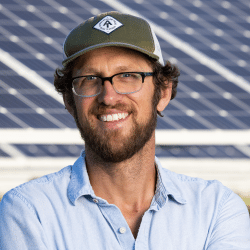Introduction
Alpha seeks to avert a global food crisis by sparking new generations’ interest in agriculture. He is reframing agriculture as an exciting, impactful career and creating pathways for inspired youth to grow their knowledge, build technical skills, and receive career support.
The New Idea
Alpha is inspiring young people in the Caribbean to value agriculture and explore opportunities in the sector, changing the mindsets of a generation that sees little appeal in farming. Through WHYFARM (We Help You-th Farm) He developed a multi-channel strategy that extends from youth into adulthood, balancing entertaining content with important lessons on nutrition, food security, sustainability, and more.
At the heart of his approach is tapping into the power of pop culture and mass media to shift mindsets—showing “why” youth should care by making agriculture cool. Alpha created AGRIman, the first superhero farmer who fights food insecurity, to overcome the stigma attached to agriculture and teach valuable lessons in a fun way. AGRIman and his squad are the protagonists of a communications ecosystem that spans a comic book series, an online video series, branded food products, as well as live events. This character has captured the attention of young audiences, planting a seed of interest that they can nurture through WHYFARM’s many education programs inside and outside of school.
For young adults, WHYFARM offers professional development opportunities to support careers in the field. Offering university courses, entrepreneurship programs, and access to decisionmakers, Alpha is bringing new talent into the food value chain while helping youth find a purpose as changemakers engaged in solving global food challenges.
Alpha aims to spark a global movement. Leveraging open-access content and valuable partnerships with government agencies, businesses, universities, and international organizations, WHYFARM has been able to rapidly expand programs into nine countries beyond Trinidad and Tobago: Brazil, St. Kitts and Nevis, Cameroon, Colombia, Haiti, Kenya, Nigeria, Rwanda, and Zimbabwe. WHYFARM’s network of Young Ambassadors has been key to this growth. Additionally, WHYFARM partners with leading organizations in the field, including the United Nation’s Food and Agriculture Organization (FAO), with whom they contribute to policy development around innovation in agriculture in the Caribbean.
The Problem
Our ability to feed the world in 2050 hinges on the life paths of children who are just 10 years old today. By 2050, the world’s population is expected to be 9.7 billion people. According to the FAO, we will need to increase food production by 60% between now and then to accommodate this growth.
Yet few young people are taking up farming. Most of the world's food is produced by ageing farmers (the average age is 60 years old) and without younger people entering the field, by mid-century there will be a shortage of farmers, and therefore of food. In the Caribbean, 70% of farmers are over 40 years old.
Young generations do not view agriculture as an attractive career path and associate it with back-breaking labor and poverty. Instead, they migrate to cities in search of better-remunerated employment opportunities. A FAO report on Youth and Agriculture found that “many young people do not perceive agriculture as a viable or attractive means of earning a living. The drudgery of low productivity agriculture is simply not attractive to youth.” In the Caribbean, the generational gap is furthered by the stigma that taints agricultural work—a legacy of slavery—as reported by U.S. Government studies and the Inter-American Institute for Cooperation on Agriculture.
Beyond crippling the productive capacity of the industry, an aging agricultural workforce is also less likely to innovate. Yet new, sustainable practices and technologies are urgently needed to face the challenges posed by climate change. Agriculture has a critical role to play in responding to climate change. On one hand, the UN reports that food systems are responsible for more than a third of global greenhouse gas emissions. Reducing environmental impacts in the production, distribution, and consumption of food is therefore pivotal to reach emissions targets. On the other hand, farmers are on the frontlines of climate change impacts. Droughts, desertification, and extreme weather events have become increasingly common, devastating farmers’ livelihoods. To meet these challenges, new talent is required at all levels of the food system.
However, young people worldwide face the barrier of poor technical training, especially in the direction of sustainable agriculture. practices. Although there is little data from the Caribbean, one study from the FAO found that young farmers in Africa named “learning digital and technical skills” as their biggest obstacle to a career in farming. In Trinidad and Tobago, this barrier is especially salient since farming is largely a subsistence-based activity with sparse financial and technical backing, so there is little possibility to invest in improvements and adopt more sustainable practices.
The Strategy
Alpha is addressing these challenges by inspiring new generations to see agriculture as a field ripe for innovation, presenting exciting professional opportunities as farmers or otherwise. His strategy builds awareness through entertainment while creating pathways for inspired youth to grow their knowledge of agriculture, build technical skills, and ultimately reverse the enduring stigma against farming.
AGRIman, WHYFARM’s cartoon superhero, has become an effective tool for Alpha to scale his education approach. He used the comic book series to develop a program for schools to integrate AGRIman’s lessons into their classrooms. A pilot that reached over 2,600 Trinidadian students under 18 led to a partnership with the Ministry of Education to expand it to primary schools nationwide. WHYFARM created a series of AGRIman comics tailored to Trinidad’s existing national curriculum of agriculture, and now plans to train teachers to fuel excitement and ensure implementation.
To reinforce learning, WHYFARM engages youth through hands-on activities that aim to help them reconnect with their food sources. Children can dive deeper by joining the “WHYFARM AgriVenture Project,” a two-month summer camp; or the “Agrikoolture Kidz Klub,” an after-school program to learn how to set up food gardens (with an active membership of children). Families can also experience agriculture in a new way at WHYFARM’s demonstration farm called the “Agricultural Fun, Museum, and Food Factory Park,” which attracted 1,800 people in its first year.
Alpha’s strategy for replication is open-sourcing AGRIman educational content and recruiting young volunteer ambassadors who bring the WHYFARM movement to their communities. WHYFARM ambassadors promote Alpha’s goal of engaging youth in agriculture by running summer camps (similar to Why Farm’s AgriVenture Series), conducting school visits, and distributing AGRIman material. AGRIman comics were also independently adopted by Brazil’s Ministry of Culture as part of an Agriculture School Tour that reached over 40,000 students across 10 states.
To reach young adults, WHYFARM runs “agripreneurship” programs that provide tools and support to pursue agribusiness professionally. In 2019, WHYFARM launched the first iteration of the Agripreneurs Mastermind Challenge, an innovation challenge for entrepreneurs aged 18-30 to incubate projects or businesses focused on strengthening the food value chain and Caribbean economies. The program trained participants in skills related to ideation, social entrepreneurship, business models, and fundraising, among others. Participants from the pilot cohort have reported progress in accessing professional development, funding, and partnership opportunities. 83% of participants went on to further their agribusinesses and are still in operation currently.
Based on this success, the program has evolved into a shorter bootcamp run with corporate partners, providing a flexible tool for Alpha to reach more young people while bringing funding to the organization. For example, in 2023 Nestlé sponsored a challenge with over 300 participants. Alpha has also collaborated with universities internationally and organizations like Thought for Food to offer more in-depth courses in agripreneurship.
Thanks to the excitement about agriculture that Alpha has sparked in Trinidad and Tobago, he has expanded his scope to strengthen food security and economic opportunities at a community level. He started during the pandemic establishing 6 community gardens together with local authorities, companies, and international organizations like Global Environment Facility. Community members were trained in farming and home gardening for self-consumption as well as agripreneurship to develop value-added products. Since then, WHYFARM has become a convener for local farmers and agripreneurs, both young and old. In 2023, Alpha launched the Agripreneur Incubator Design Lab (AIDLAB), a facility that supports agripreneurs to access processing equipment and scale up their products to reach larger consumer markets. He also introduced the Farmers Collective, where farmers exchange labour, ideas and motivation and share profits. WHYFARM enables farmers and agripreneurs to market their products through a partnership with Massy Stores, the leading Caribbean supermarket chain.
More recently, Alpha has been involved in contributing to policy development. One such collaboration was with the Food and Agriculture Organisation (FAO), in strengthening digital agriculture in Trinidad and Tobago. WHYFARM’s role was to conduct research within the agriculture community and inform a policy framework that would create an enabling environment for digital agriculture to be adopted easily in Trinidad and Tobago with special provisions for youth. Currently, Alpha has joined CARDI, the European Union, and six other partners on a project to increase resilience to climate-related food insecurity risks in Trinidad and Tobago and St. Kitts and Nevis.
The Person
Although Alpha grew up on a farm in Trinidad and Tobago, he did not feel a personal connection with farming when he was young. “It just felt like chores,” he said. “I was missing the connection to a great purpose.” Like many young people, for Alpha, working the land had become “a symbol of oppression, rather than freedom.”
As a college student, Alpha stayed as far away from farming as he could, until, on a trip to Jamaica, he toured farms and factories, and saw how large-scale agricultural production could be if managed as a business. This opened his eyes to the innovative potential of agriculture. Alpha traveled more widely, witnessing sustainable farming techniques in India, and studying abroad in Thailand. As he visited more farms, Alpha began to envision implementing the practices he was learning about in his home country. He recognized enlisting young people was the key; they had to be exposed to agriculture before their negative attitude toward it hardened so they could bring fresh eyes to the profession.
To that end, Alpha took leadership roles in college organizations such as the Executive Committee for Agriculture and the Agribusiness Society. As a Youth Representative for Agriculture, he noticed that older members of the Society were recycling failed approaches from the past and were resistant to new ideas proposed by younger members. Alpha decided the solution was to connect directly with youth and empower them to bring their innovations forward. That was the genesis of WHYFARM and AGRIman.
Alpha’s work has been recognized with many international awards including the Misk Global Challenge award, sponsored by the Bill and Melinda Gates Foundation. Alpha was named the 2021 national influencer by the prime minister of Trinidad and Tobago (the first time a farmer has received the accolade), one of 30 Under 30 Caribbean American Emerging Leaders and Changemakers, and one of 2016’s Young Leaders of the Americas. Alpha is currently a Specialist Business Mentor for Agriculture with the Caribbean Centre of Excellence for Sustainable Livelihoods and serves on the Next Gen Council for the Thought for Food Global Foundation, where he is also an ambassador for the Caribbean.


